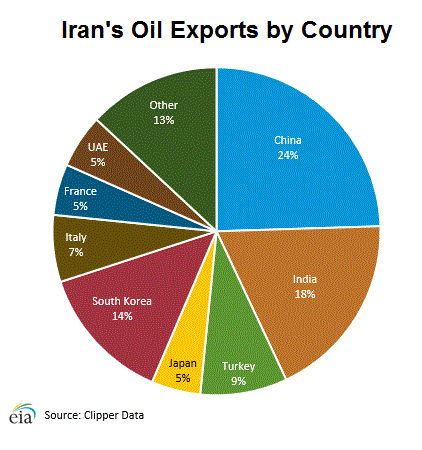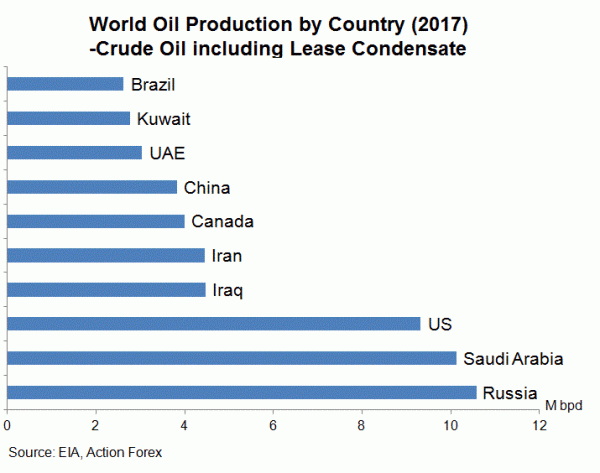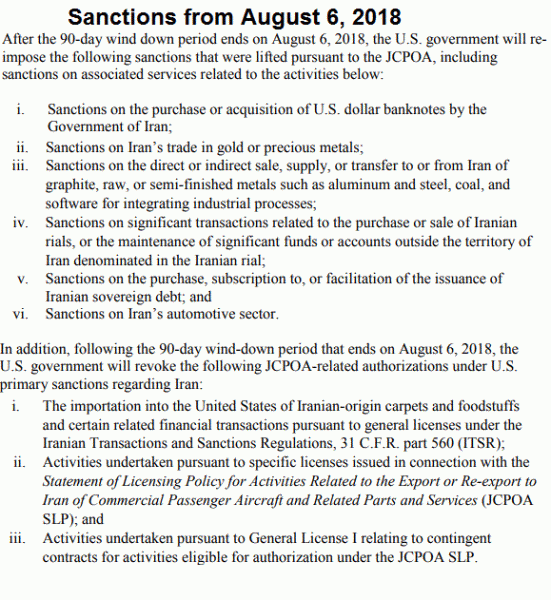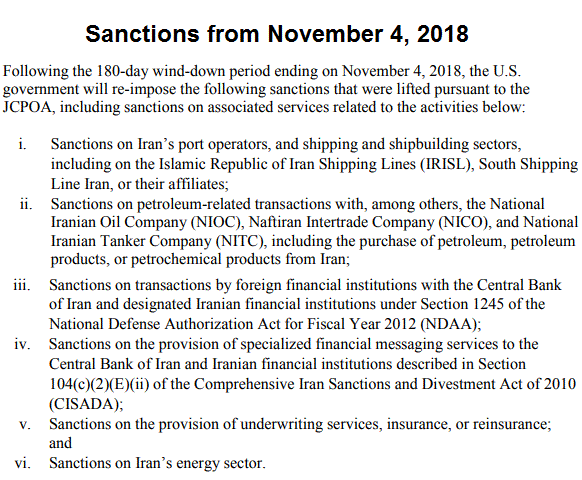Donald Trump confirmed that the US would withdraw from the Iran nuclear deal, an agreement reached in 2015 between Iran, the P5+1 (5 UNSC permanent members including US, France, Russia, UK, China + Germany) and the European Union. New sanctions, both financial sanctions and bans of oil exports, would be re-instituted on Iran. The closely-watched crude oil prices slumped from almost 4-year highs before recovery. The front-month WTI contract slumped to US$ 67.63/bbl after the news before regaining the level of US$ 70/bbl in Asia session today. The contract jumped to US$ 70.84/bbl last Friday. While managing to make a fresh 3.5-year high earlier today, the Brent crude contract retreated modestly after the news before closing largely flat. Brent oil price is more affected by Trump’s move as Iran’s oil exports are mainly destined to European and Asian countries. Geopolitical uncertainty would likely cause great volatility in the oil market in the near term. In the longer-term, we believe the move has more implications on geopolitics than oil fundamentals, both would affect oil prices and the financial markets, though.
In signing an executive order that will withdraw the US from the Iran nuclear deal, Trump has triggered a 180-day countdown period for the White House to re-institute all of the sanctions on Iran that were relaxed according to the deal. Many of the sanctions (see end of the report) would be re-instituted in 90 days, by August 6, though. Financial market reaction to the announcement was rather muted as it probably has “priced in”. Moreover, if Trump had not chosen to scrap the deal, he would have renewed the waiver but reiterated his opposition to it. The latter only delay the decision for some time.
Iran’s Oil industry
As a founding member of OPEC, Iran holds the world’s fourth-largest proved crude oil reserves (10%) and the world’s second-largest natural gas reserves (13%). While the United Nation Security Council (UNSC) began imposing nuclear activities-related sanctions against Iran in 2006, what affected the country’s oil industry most were those imposed in 2011 and 2012. Accompanied with the economic recession after the global financial crisis, the sanctions had sent Iran’s oil production to about 3M bpd, compared with about 4M bpd prior to that. European refiners had been purchasing and processing Iranian crude oil until those sanctions. A number of European countries, including Croatia, France, Greece, Italy, Malta, Netherlands, Poland, and Spain, resumed their purchases as the sanctions were lifted in 2015. According to the US Energy Information Agency (EIA), Iran produced nearly 4.7M bpd of petroleum and other liquids, of which 3.8M bpd was crude oil. Iranian total liquids production rose in 2017 relative to 2016 by +0.5M bpd. Last year, oil production of Saudi Arabia and the US reached 10M bpd. Crude oil and condensate exports averaged 2.5M bpd in 2017, up +0.2M bpd from the 2016 average. China and India accounted for about 43% of all Iranian exports in 2017, and Turkey and South Korea took substantial volumes during the year.

Impacts of Withdrawal might be Limited
Whether Trump’s renewed sanctions against Iran would significantly tighten the oil market remains to be seen. So far, it is the US’ unilateral action to pull out of the plan and other countries are condemning his action. As French President Emmanuel Macron commented, “France, Germany, and the UK regret the US decision to leave the JCPOA. The nuclear non-proliferation regime is at stake”. Israel has been the only country openly supporting this move. Prime Minister Benjamin Netanyahu praised it as a “brave decision” as the deal has “allowed Iran to enrich enough uranium for an entire arsenal of nuclear bombs”. Iran’s oil is mainly destined to Asia and Europe. If these countries choose to continue adhering to the deal, it should not have much impact on the oil exports. Impact on US oil supply should be limited Thanks to the aggressive shale investment over the past years, the US is largely self-sufficient oil.
Intensifying Geopolitical Uncertainty
While US’ withdrawal from the deal might have limited impacts oil fundamentals, the move can have lasting legacy from geopolitical perspective. The move is deliberately provocative in nature. This could encourage retaliation from Iran which, once again depending on whether other powers would follow the US, might find strong reasons to resume development of mass destruction weapons. Trump’s decision would inevitably destabilize the Middles East. Moreover, it has also dampened the prospect of denuclearizing North Korea, which possesses nuclear weapons but has recently indicated the willingness to denuclearize under certain conditions. Trump’s decision has presented to North Korea and other powers in the world that negotiating with the US is worth little.



